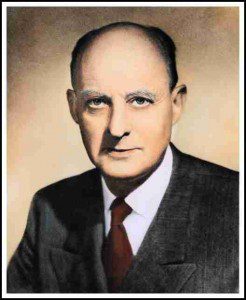Reinhold Niebuhr was born on this day in 1892. He and his brother H. Richard Niebuhr would become two of the most significant of American Protestant thinkers, whose influence extended deeply into our culture. Speaking of the birthday boy, I think more for the good than ill, although it could be and is argued otherwise. I would add they had a sister, Hulda Niebuhr who would also become a professor of religious education, mostly at the Presbyterian McCormick Theological Seminary in Chicago.
Raised in the German Evangelical Church, in which their father was a minister, Reinhold attended Elmhurst College, which at the time was a school of the German Evangelical Church (which would eventually join with two other denominations, including the Congregational Church in the creation of the United Church of Christ), and from there, significantly went to Yale. In later years he would acknowledge his debt to that school in liberating him from the parochialism of his life up until then.
He was ordained in 1915 and began serving as a pastor in Detroit. He found himself drawn into a public ministry when opposing the rise of the Ku Klux Klan. He was preaching and acting out of the Social Gospel. But, his thinking gradually found problems with liberalism as it was manifesting. He was particularly concerned with the inherent optimism within the liberal project.
Reinhold embraced pacifism and socialism. And he began to write. His first book Notebook of a Tamed Cynic was just the beginning of a prolific writing career. In 1928 he was appointed professor of Practical Theology at Union Theological in Manhattan.
Gradually his thinking began to be influenced by Karl Barth’s neo-Orthodoxy. The turn was represented in his Moral Man and Immoral Society. By the beginning of the Second World War he had rejected socialism, although he remained progressive, and pacifism in favor an engaged pragmatism informed by his sense of the powerlessness of human beings in this world. And the broad outlines of Christian Realism, his mature theology began to form.
The Wikipedia article on the subject summarizes “Christian Realism (as) a philosophical perspective developed by the theologian and public intellectual Reinhold Niebuhr in the late 1940s and early 1950s. Niebuhr argued that the Kingdom of God cannot be realized on earth because of the innately corrupt tendencies of society. Due to the injustices that arise on earth, a person is therefore forced to compromise the ideal of the kingdom of heaven on earth. Niebuhr argued that human perfectibility was an illusion, highlighting the sinfulness of humanity at a time when the world was confronted by the horrors of experiences such World War II, the reigns of both Adolf Hitler and Joseph Stalin, and the Holocaust.”
Yun Jung Moon’s article on Niebuhr in the Boston Collaborative Encyclopedia of Modern Western Theology offers a critical but sympathetic analysis of Niebuhr’s Christian Realism.
“He criticizes orthodox Christianity, modern liberal Christianity and Marxism. The former identifies the transcendent will of God with doctrines and degrads myths by scientification, the second abandons the ethic of Jesus and absolutizes secular, relative standards of morality, and the latter is a secularized religion which takes the proletariat as the final judge instead of God. For Niebuhr, myth is meaningful in the sense that it involves the paradox between the Infinite and the finite, and it should be considered seriously, not literally. The ethic of Jesus shows the pure form of God’s love so that it cannot be realized in this present human existence, but only when God changes this world to the perfect harmony of the Kingdom of God.”
As it relates to the political sphere, Moon points to the critical matter. “Instead of the direct application of the law of love to political and economical reality, he suggests the principle of justice as an approximation of love. ‘Yet the law of love is involved in all approximations of justice, not only as the source of the norms of justice, but as an ultimate perspective by which their limitations are discovered.’”
What may be most important is how his thinking influenced contemporary American political thought including Martin Luther King, jar’s public ministry as well as the politicians Jimmy Carter, Barack Obama, and Hillary Clinton. Political thinkers on the right of the American political spectrum have also been influenced by him, although they have largely been criticized for ignoring his constant call to social justice, a central theme of Niebuhr’s project.
Nowhere is Niebuhr’s influence on President Obama more clear than in his Oslo speech. And his influence continues as this conversation shows.
As sort of a footnote, Reinhold Niebuhr wrote a prayer “Father, give us courage to change what must be altered, serenity to accept what cannot be helped, and the insight to know the one from the other.”
Someone unknown took that and reworked it as what we now call the serenity prayer.
God grant me the serenity to accept the things I cannot change,
Courage to change the things I can,
And the wisdom to know the difference.
To which I can only add, amen.













